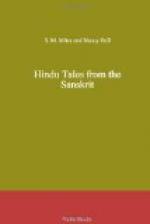“No, no. Where is your youngest brother Sringa-Bhuja? He alone will be able to save your homes, your wives and your children, from destruction,”
Then Sringa-Bhuja came forward; and as the sun flashed upon the jewels in the stolen arrow, revealing to the watching king that it was his own beloved son who had taken it, the young prince let it fly straight for the bird. It wounded but did not kill the crane, which flew off with the arrow sticking in its breast, the blood dripping from it in its flight, which became gradually slower and slower. At the sight of the bird going off with the precious jewelled arrow, the king was filled with rage, and sent orders that Sringa-Bhuja should be fetched to his presence immediately. But before the messengers reached him, he had started in pursuit of the bird, guided by the blood-drops on the ground.
5. Did the brothers show wisdom in the plot they laid against their brother?
6. What do you think from this story, so far as you have read it, were the chief qualities of Sringa-Bhuja?
CHAPTER IV
As Sringa-Bhuja sped along after the crane, the beggar made some strange signs in the air with the staff he used to help him along; and such clouds of dust arose that no one could see in which direction the young prince had gone. The brothers and Ayasolekha were very much dismayed at the way things had turned out, and greatly feared that the king’s anger would vent itself on them, now that Sringa-Bhuja had disappeared. Vira-Bhuja did send for them, and asked them many questions; but they all kept the secret of how Sringa-Bhuja had got the arrow, and promised to do all they could to help to get it back. Again the king thought he would go and see the mother of his dear youngest son; but again something held him back, and poor Guna-Vara was left alone, no one ever going near her except the gaoler who took her her daily food. After trying everything possible to find out where Sringa-Bhuja had gone, the king began to show special favour to another of his sons; and as the months passed by, it seemed as if the young prince and the jewelled arrow were both forgotten.
Meanwhile Sringa-Bhuja travelled on and on in the track of the drops of blood, till he came to the outskirts of a fine forest, through which many beaten paths led to a very great city. He sat down to rest at the foot of a wide-spreading tree, and was gazing up at the towers and pinnacles of the town, rising far upwards towards the sky, when he had a feeling that he was no longer alone. He was right: for, coming slowly along one of the paths, was a lovely young girl, singing softly to herself in a beautiful voice. Her eyes were like those of a young doe, and her features were perfect in their form and expression, reminding Sringa-Bhuja of his mother, whom he was beginning to fear he would never see again.
When the young girl was quite close to him, he startled her by saying, “Can you tell me what is the name of this city?”




